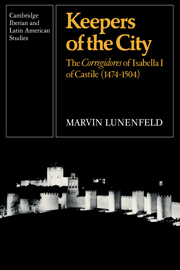Book contents
- Frontmatter
- Contents
- List of tables
- Glossary
- Map: Distribution of royal jurisdictions (1474–1504)
- 1 The omnicompetent servant
- 2 Establishing authority
- 3 The naked sword (1474–85)
- 4 Faithful servants (1485–94)
- 5 Careers open to talent: judicature, remuneration, residencia
- 6 Lords and prelates: a matter of privilege
- 7 The end of convivencia: Jews, Christians, and Muslims
- 8 Difficult governance (1495–1504)
- 9 The queen in heaven: troubled aftermath
- Notes
- Select bibliography
- Index
6 - Lords and prelates: a matter of privilege
Published online by Cambridge University Press: 05 November 2011
- Frontmatter
- Contents
- List of tables
- Glossary
- Map: Distribution of royal jurisdictions (1474–1504)
- 1 The omnicompetent servant
- 2 Establishing authority
- 3 The naked sword (1474–85)
- 4 Faithful servants (1485–94)
- 5 Careers open to talent: judicature, remuneration, residencia
- 6 Lords and prelates: a matter of privilege
- 7 The end of convivencia: Jews, Christians, and Muslims
- 8 Difficult governance (1495–1504)
- 9 The queen in heaven: troubled aftermath
- Notes
- Select bibliography
- Index
Summary
“Through her was destroyed the haughtiness of the wicked aristocrats, who were disobedient, and traitors to the royal crown,” wrote Andrés Bernáldez, upon recording the death of his queen. Isabella and her advisors did check abuses, although on a selective basis that escaped the notice of the humble curate of Los Palacios. Troublesome individuals were chastised, yet the high estates as a whole were little diminished, for the most significant finding in the modern literature is that Isabella relied so heavily upon the great families to govern that she felt compelled to advance their fortunes with augmented prestige, titles, enormous grants of land, and rich gifts. She needed support and she bought it.
From the stature accorded genealogical studies at this time it might be supposed that this aristocracy was ancient; but, on the contrary, the houses which dominated Castile saw their rapid growth in the fifteenth-century, when some two dozen seignorial estates mushroomed in size until they overshadowed all others. In lower Andalusia the council of Seville administered fifty hamlets, compared to the lords' eighty in the same jurisdiction. For Cordova, the city ruled twenty while the lords had over thirty. These areas also saw an additional fifteen hamlets in the hands of military orders and the cathedral of Seville. The reign shows a continuing increase in the assembling and legal confirmation of entailed estates (mayorazgos).
- Type
- Chapter
- Information
- Keepers of the CityThe Corregidores of Isabella I of Castile (1474-1504), pp. 107 - 123Publisher: Cambridge University PressPrint publication year: 1987



